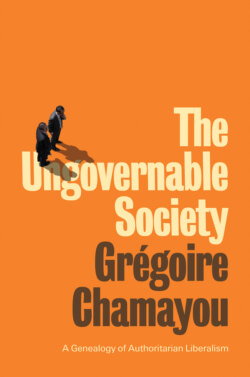Читать книгу The Ungovernable Society - Grégoire Chamayou - Страница 19
Notes
Оглавление1 1. Joseph A. Schumpeter, Capitalism, Socialism and Democracy (London and New York: Routledge, 1976), p. 142.
2 2. David T. Bazelon, ‘The Scarcity Makers’, Commentary, XXXIV, October 1962, pp. 293–304 (p. 293).
3 3. Adolf A. Berle and Gardiner C. Means, The Modern Corporation and Private Property (New York: Routledge, 2017; first published in 1932).
4 4. Paraphrased by Robert Hessen, ‘The Modern Corporation and Private Property: A Reappraisal’, Journal of Law and Economics, vol. 26, no. 2, 1983, pp. 273–89 (p. 273). See John Kenneth Galbraith, ‘Books review: Berle and Means, “The Modern Corporation and Private Property”’, Antitrust Bulletin, vol. 13, no. 4, 1968, p. 1527.
5 5. Adolf A. Berle, ‘Modern Functions of the Corporate System’, Columbia Law Review, vol. 62, no. 3, March 1962, pp. 433–49 (p. 434).
6 6. Hessen, ‘The Modern Corporation’, p. 280.
7 7. Berle and Means, The Modern Corporation and Private Property, p. 64.
8 8. Thorstein Veblen, Absentee Ownership: Business Enterprise in Recent Times – The Case of America (New York: Routledge, 2017; first published in 1923), p. 66.
9 9. Berle and Means, The Modern Corporation and Private Property, p. 8.
10 10. Ibid., p. 65.
11 11. Ibid., p. 113.
12 12. Ibid., p. 6.
13 13. Walther Rathenau, In Days to Come (London: G. Allen & Unwin, 1921), p. 121, quoted in Berle and Means, The Modern Corporation and Private Property, p. 309.
14 14. James Burnham, The Managerial Revolution (New York: John Day, 1941). The neologism ‘managerialism’ seems to have appeared for the first time in a review of this book by Burnham, though the latter did not himself employ it, preferring the term ‘managerial society’. See H.S. Person, ‘Capitalism, Socialism and Managerialism’, Southern Economic Journal, vol. 8, no. 2, 1941, pp. 238–43.
15 15. Note that Orwell was here reporting an idea that he did not share. See George Orwell, ‘Second Thoughts on James Burnham’ (1946), in The Complete Works of George Orwell, vol. 18 (London: Secker & Warburg, 1986), pp. 268–84 (p. 269). Drawing on Rizzi’s La Bureaucratisation du monde (1939), Burnham reinterprets the separation of ownership and control announced by Berle and Means as a split between two modes of control: managers have control in one sense, in that they concentrate the functions of leadership – what he calls ‘control over access’ – but shareholders always have control in a second sense, in that they carve out for themselves the lion’s share in the allocation of profits – ‘control over distribution’. But such a situation can, in his view, persist: ‘control over access is decisive, and, when consolidated, will carry control over preferential treatment in distribution with it: that is, will shift ownership unambiguously to the new controlling, a new dominant, class’ (Burnham, The Managerial Revolution, p. 59). In his view, this process is already well underway: it is transnational and trans-regime: Stalinist bureaucracy, fascist dirigisme and New Deal interventionism represent, in his view, three versions of one and the same phenomenon.
16 16. Berle and Means, The Modern Corporation and Private Property, p. 8.
17 17. The rich, ‘in spite of their natural selfishness and rapacity […], though the sole end which they propose from the labours of all the thousands whom they employ, be the gratification of their own vain and insatiable desires, […] divide with the poor the produce of all their improvements. They are led by an invisible hand to make nearly the same distribution of the necessaries of life, which would have been made, had the earth been divided into equal portions among all its inhabitants, and thus without intending it, without knowing it, advance the interest of the society […]’ (Adam Smith, The Theory of Moral Sentiments (Metalibri Digital Editions, 2005), p. 165 [available online at https://www.ibiblio.org/ml/libri/s/SmithA_MoralSentiments_p.pdf]).
18 18. Berle and Means, The Modern Corporation and Private Property, p. 9.
19 19. Ibid., p. 304.
20 20. Ibid.
21 21. Ibid., p. 9.
22 22. ‘The directors of such companies, however, being the managers rather of other people’s money than of their own, it cannot well be expected that they should watch over it with the same anxious vigilance with which the partners in a private copartnery frequently watch over their own. Like the stewards of a rich man, they are apt to consider attention to small matters as not for their master’s honour, and very easily give themselves a dispensation from having it. Negligence and profusion, therefore, must always prevail, more or less, in the management of the affairs of such a company’ (Smith, The Wealth of Nations, pp. 574–5). See also Berle and Means, The Modern Corporation and Private Property, p. 115.
23 23. Schumpeter, Capitalism, Socialism and Democracy, p. 157, n. 1.
24 24. Berle and Means, The Modern Corporation and Private Property, p. 115.
25 25. Henry G. Manne, ‘Current Views on the Modern Corporation’, University of Detroit Law Journal, vol. 38, 1961, pp. 559–88 (p. 560).
26 26. Berle and Means, The Modern Corporation and Private Property, p. 302.
27 27. ‘The explosion of the atom of property destroys the basis of the old assumption that the quest for profits will spur the owner of industrial property to its effective use. It consequently challenges the fundamental economic principle of individual initiative in industrial enterprise. It raises for reexamination the question of the motive force […], and the ends for which the modern corporation can be or will be run’ (Berle and Means, The Modern Corporation and Private Property, p. 9).This does not merely undermine the hypothesis of the maximization of profit as a realistic description of entrepreneurial behaviour, but denies the institutional basis of the traditional profit motive (see Edward S. Mason, ‘The Apologetics of “Managerialism”‘, The Journal of Business, vol. 31, no. 1, January 1958, pp. 1–11 [p. 6]).
28 28. Richard Sedric Fox Eells, The Government of Corporations (Glencoe, IL: Free Press of Glencoe, 1962), p. 16.
